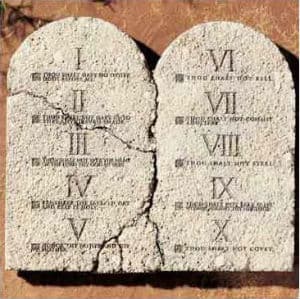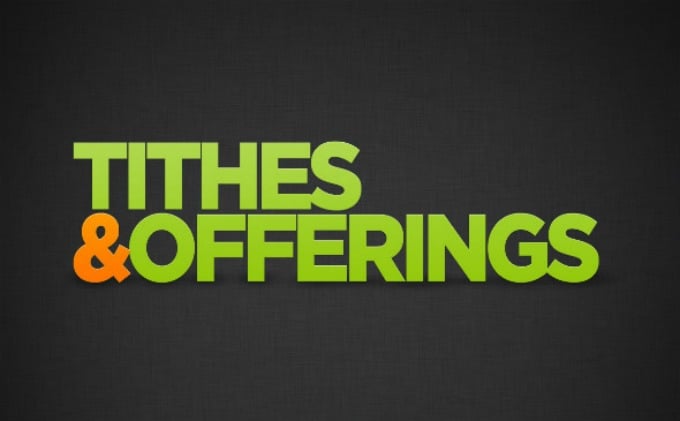Back in the day when I became a Christian, tithing was a foreign concept to me.
When I learned about “giving 10 percent,” the concept got even scarier.
Wow, 10 percent is a lot of money, I thought.
Back then I was looking at “the love of money” and not “the love of God.”
It took years for me to come to grips with what tithing is really all about, and a few more years to actually “tithe on everything”, on all forms of income.
I had to answer the question, “Why am I holding back from God? After all, did Jesus give 10 percent toward my salvation or 100 percent?”
From that viewpoint, 1/10th doesn’t seem that much.
Tithing, in its simplest form, is a way to honor God through love, obedience and worship. It’s a way of saying Lord, you have given me everything through your Son Jesus, so I give back a portion to you.
And I can honestly say I have been blessed ever since. God doesn’t need my money. God wants ME.
Why do we tithe? What are the reasons for tithing? Does God command us to tithe? Let’s take a look.
Tithe means “a tenth.” The term “tithing” is an Old Testament application that can be referred to in the New Testament as “free will” giving. It’s still the same God.
What has changed is this: The Israelites were commanded by God to tithe on several levels to support the priestly order of the Levites, who had no land and no inheritance.
They tithed 10 percent to the Levites annually, 10 percent annually to feasts of worship, and 10 percent once every three years to the poor and indigent. It’s been calculated that their tithes totaled over 23 percent a year.
When Jesus took our sins on the Cross at Calvary, both Jew and Gentile alike were no longer under the Mosaic Law.
We give honor to God with our tithes. And through them, God’s church builds, takes care of the poor, evangelizes, and prospers.
The first time tithing is mentioned in the Bible is Genesis 14:18-20:
The background: After Lot is captured in the battles of the kings, he is rescued by Abraham. Melchizedek, the King and high Priest, administers bread and wine and blesses Abraham, after which Abraham pays tithes, declining to accept the spoils of war.
“And Melchizedek king of Salem brought forth bread and wine: and he was the priest of the most high God. And he blessed him, and said, Blessed be Abram of the most high God, possessor of heaven and earth: And blessed be the most high God, which hath delivered thine enemies into thy hand. And he gave him tithes of all.”
Continuing with the Mosaic Law in support of the Levites, tithing was required on herds and flocks:
“Every tenth animal that passes under the shepherd’s rod…” (Leviticus 27:32).
Tithing was required of the Israelites on agricultural products:
“A tithe of everything from the land, whether grain from the soil or fruit from the trees, belongs to the Lord; it is holy to the Lord” (Leviticus 27:30).
As Christians, we are no longer under the Mosaic Law, thus not “ordered” to tithe under fear of punishment. 
But giving is addressed in the New Testament by the Apostle Paul in 1 Corinthians 16: 1-2.
“Now concerning the collection for the saints, as I have given orders to the churches of Galatia, so you must do also: On the first day of the week let each one of you lay something aside, storing up as he may prosper, that there be no collections when I come.”
Call it tithing or “free will” giving, the amount you give is proportionate to the degree that God blesses you, without an obligatory figure being mentioned. It is “what you purpose to give.” It is between you and God.
I like 1/10th because it is biblical.
Practical Reason for Tithing
There is also a practical reason for tithing, and that is in support of the church and its staff. Romans 4:4 tells us:
“Now to the one who works, his wage is not credited as a favor, but as what is due.”
Also 1 Timothy 5:18: “The laborer is worthy of his wages.”
Does the staff of a church not labor? Should they not be paid accordingly? If we don’t support church staff, who will?
Three of my favorite scriptures on the subject, one from the Old Testament and two from the New Testament, are truly words to live by:
Malachi 3:10-12
“Bring the whole tithe into the storehouse, that there may be food in my house. Test me in this,” says the Lord Almighty, “and see if I will not throw open the floodgates of heaven and pour out so much blessing that you will not have room enough for it.”
Luke 6:38 (For those who debate tithing off the gross or the net).
“Give, and it will be given to you. Good measure, pressed down, shaken together, running over, will be put into your lap. For with the measure you use it will be measured back to you.”
2 Corinthians 9:7
“So let each one give as he purposes in his heart, not grudgingly or of necessity; for God loves a cheerful giver.”
Speaking from experience, those verses are 100 percent true. 
For years I was a grudging giver. But as my love for the Lord grew, so did my leap to “cheerful giver.”
What is the point of giving if you have no joy in it?
Why give if your heart is not in it?
Tithing is a Matter of Trust
Do you trust in the Lord? Do you trust that He will take care of you? Is our God a God of His Word? If He says He will bless us, will He not? Do not all good things come from God?
Tithing is only as complicated or as easy as you want to make it.
Tithing can be a controversial subject in today’s church.
You can look for biblical loopholes to get out of tithing, or you can embrace the concept that you are giving to God because He gave so much to you.
Tithing, then, is a freedom, not a requirement. Tithing is an act of worship and an expression of love.
Money is not love. The act of giving is.


It’s so true what you write Ani, tithing is a matter of love and trust. I never used to tithe before until I became serious about my Christianity. It has made a world of difference in my life. Not because of the financial blessing, but because of where God took my relationship with Him.
amen Peter.. I remember when my children were small and i was fighting tithing in my head cause i only had so much money and i wanted to use it to feed my kids, but there was a voice in my head that said put it in the basket (was in church) and see what i will do.. I obeyed the lord and gave all i had and a woman who i didnt even know sitting next to me gave me a envelope with money in it and on the outside it read ” the Holy Spirit told me to give this to you”.. it was the exact amount of money i put in the basket. God is teaching us like peter says to trust him and he will not leave us empty handed. Ive seen God many times stretch my little checks and had money in the mail coming in to me, when I owed them..:)
Wow, that is so amazing Eugenia! I loved reading this story 🙂
Very confusing writing?
* A “tithe” is a tenth…period. It is not “free will giving” or an offering. Words mean things.
* At one point in this article the author says, “It is between you and God” and next says, “I like 1/10th because it is biblical”. This tends to confuse readers. The first sentence “It is between you and God” is biblical for Christians. Giving a tithe (1/10th) is only biblical for Christians IF God has personally spoken to them to give that amount. It is no more “biblical” than if God spoke to give 7% or 15% or $25 or $125.
* Tithing should not be encouraged to Christians: it should be giving as God speaks to you.
* The New Testament speaks of generous giving according to a person’s ability.
* The New Testament never says that tithing is commanded or a standard for the believer today.